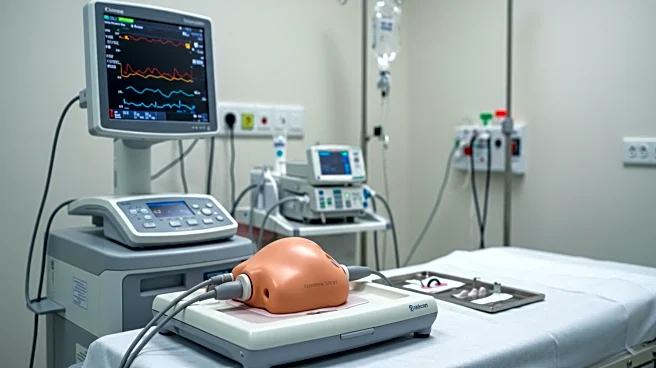What's Happening?
Recent research has demonstrated the effectiveness of simulation-based training in acquiring neonatal echocardiography skills. The study involved 43 neonatal caregivers, including neonatologists and fellows, who underwent didactic sessions followed by hands-on simulator training. The results showed significant improvements in image acquisition and anatomy identification skills among participants, regardless of their prior experience with echocardiography. The study supports the use of simulators as a valuable tool for training neonatal care providers, enhancing their proficiency in echocardiography and potentially improving patient outcomes.
Why It's Important?
The findings highlight the importance of simulation-based training in medical education, particularly in specialized fields like neonatal care. By providing a controlled and realistic environment for practice, simulators can enhance the learning experience and skill acquisition for healthcare professionals. This approach not only improves the quality of care provided to neonatal patients but also addresses the need for efficient and effective training methods in the medical field. The study underscores the potential of simulation technology to bridge gaps in traditional training methods and equip healthcare providers with the necessary skills to handle complex medical procedures.
What's Next?
The study suggests further development and integration of simulation-based training in medical education curricula, particularly for neonatal care providers. As the technology continues to evolve, there is potential for more extensive training courses that incorporate simulation to enhance skill acquisition and proficiency. The research encourages healthcare institutions to invest in simulation technology and explore its applications in various medical specialties. Additionally, ongoing evaluation and refinement of simulation training programs can ensure they meet the needs of healthcare professionals and contribute to improved patient care.
Beyond the Headlines
The study raises questions about the broader implications of simulation technology in medical education, including its role in standardizing training and reducing variability in skill acquisition. It also highlights the ethical considerations of relying on technology for training, such as ensuring accessibility and equity in educational opportunities. The research points to a potential shift in how medical training is approached, with simulation becoming a key component in preparing healthcare providers for real-world challenges.










